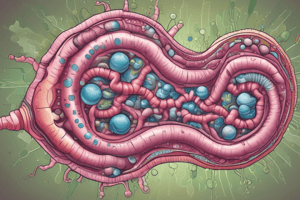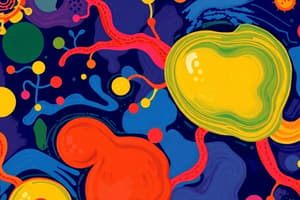Podcast
Questions and Answers
What is the primary role of Very Low Density Lipoprotein (VLDL) in the body?
What is the primary role of Very Low Density Lipoprotein (VLDL) in the body?
- Transport cholesterol to the liver
- Remove cholesterol from the body
- Convert LDL to HDL
- Circulate and deposit fats in peripheral tissues (correct)
Which lipoprotein is often referred to as 'bad cholesterol'?
Which lipoprotein is often referred to as 'bad cholesterol'?
- High Density Lipoprotein (HDL)
- Very Low Density Lipoprotein (VLDL)
- Intermediate Density Lipoprotein (IDL)
- Low Density Lipoprotein (LDL) (correct)
What does a lipid profile test measure?
What does a lipid profile test measure?
- Only total cholesterol levels
- The amount of HDL and LDL only
- The atherogenic index exclusively
- Levels of cholesterol and triglycerides in the blood (correct)
What condition is closely associated with elevated cholesterol levels in the body?
What condition is closely associated with elevated cholesterol levels in the body?
How is the atherogenic index calculated?
How is the atherogenic index calculated?
What distinguishes hydrophobic lipids from polar solvents?
What distinguishes hydrophobic lipids from polar solvents?
Which of the following statements accurately describes an amphipathic lipid?
Which of the following statements accurately describes an amphipathic lipid?
What type of lipid is primarily responsible for energy storage?
What type of lipid is primarily responsible for energy storage?
Which of the following is NOT a characteristic of lipids?
Which of the following is NOT a characteristic of lipids?
Which lipid type is categorized as a compound lipid?
Which lipid type is categorized as a compound lipid?
What is the main feature that differs saturated fatty acids from unsaturated fatty acids?
What is the main feature that differs saturated fatty acids from unsaturated fatty acids?
Which of the following lipids has a structural role in cell membranes?
Which of the following lipids has a structural role in cell membranes?
What is a key property of phospholipids that is essential for membrane formation?
What is a key property of phospholipids that is essential for membrane formation?
What is the primary role of gastric lipase in infants?
What is the primary role of gastric lipase in infants?
What pH range is optimal for gastric lipase activity?
What pH range is optimal for gastric lipase activity?
How do bile salts assist pancreatic lipase in lipid digestion?
How do bile salts assist pancreatic lipase in lipid digestion?
What is the role of co-lipase in lipid digestion?
What is the role of co-lipase in lipid digestion?
What is the final step in the digestion of lipids within the small intestine?
What is the final step in the digestion of lipids within the small intestine?
What condition is characterized by an increased fat content in feces due to lipid malabsorption?
What condition is characterized by an increased fat content in feces due to lipid malabsorption?
Why is the stomach pH in adults lower than in infants?
Why is the stomach pH in adults lower than in infants?
What is the primary role of lipoproteins in lipid transport?
What is the primary role of lipoproteins in lipid transport?
What happens to dietary fat when it enters the duodenum?
What happens to dietary fat when it enters the duodenum?
Which of the following lipoproteins transports dietary lipids from the intestine?
Which of the following lipoproteins transports dietary lipids from the intestine?
Which enzyme is primarily responsible for lipid hydrolysis in the upper small intestine?
Which enzyme is primarily responsible for lipid hydrolysis in the upper small intestine?
What is the hydrophobic core of lipoproteins primarily composed of?
What is the hydrophobic core of lipoproteins primarily composed of?
Which lipoprotein is associated with removing chylomicron remnants from the blood?
Which lipoprotein is associated with removing chylomicron remnants from the blood?
In the context of lipid transport, what does the exogenous pathway primarily involve?
In the context of lipid transport, what does the exogenous pathway primarily involve?
Which of the following is NOT a component of the hydrophilic surface of lipoproteins?
Which of the following is NOT a component of the hydrophilic surface of lipoproteins?
What is the fate of chylomicrons after transporting dietary lipids?
What is the fate of chylomicrons after transporting dietary lipids?
What is the primary action of pancreatic lipase in lipid digestion?
What is the primary action of pancreatic lipase in lipid digestion?
What is the role of bile salts in lipid digestion?
What is the role of bile salts in lipid digestion?
Which process occurs after micelles reach the brush border of intestinal mucosal cells?
Which process occurs after micelles reach the brush border of intestinal mucosal cells?
What primarily constitutes the core of chylomicrons?
What primarily constitutes the core of chylomicrons?
What is the first stage of lipid absorption after digestion?
What is the first stage of lipid absorption after digestion?
During lipid absorption, what follows the re-estrification and assembly of chylomicrons?
During lipid absorption, what follows the re-estrification and assembly of chylomicrons?
What type of lipids does phospholipase A2 act upon?
What type of lipids does phospholipase A2 act upon?
What is released during the hydrolysis of cholesterol esters by cholesterolesterase?
What is released during the hydrolysis of cholesterol esters by cholesterolesterase?
Flashcards are hidden until you start studying
Study Notes
Lipids: Definition and Solubility
- Lipids are organic compounds containing hydrogen, carbon, and oxygen atoms.
- They are nonpolar and hydrophobic, dissolving in nonpolar solvents like alcohol, chloroform, and benzene, but not in water.
- Lipids are amphipathic, meaning they have both hydrophilic (polar) and hydrophobic (nonpolar) regions.
- Examples of amphipathic lipids include phospholipids, glycolipids, and cholesterol.
Importance of Lipids
- Lipids serve as a primary storage form of energy, particularly in the form of triacylglycerol (TAGs).
- Lingual lipase, an acid-stable enzyme, initiates lipid digestion in the stomach, particularly in infants.
Digestion of Lipids
- Stomach:
- Gastric lipase hydrolyzes TAGs, especially those found in milk fat.
- Small Intestine:
- Emulsification: Bile salts, produced in the liver and stored in the gallbladder, emulsify fats into smaller droplets, increasing surface area for enzyme activity.
- Hydrolysis: Pancreatic juice contains lipases that further break down lipids:
- Pancreatic lipase hydrolyzes TAGs into 2-monoacylglycerol (MAG) and free fatty acids (FFA).
- Phospholipase A2 hydrolyzes phospholipids into lysophospholipids and FFAs.
- Cholesterolesterase hydrolyzes cholesterol esters into cholesterol and FFA.
Absorption of Lipids
- Micelles, formed by bile salts and digestion products, diffuse passively across the intestinal mucosal cells.
- Inside the cells, re-esterification of triglycerides occurs using partial glycerides and FFAs.
- Newly formed triglycerides are packaged into chylomicrons, lipoprotein particles composed of a triglyceride core and a phospholipid and protein outer layer.
- Chylomicrons are released from the mucosal cells into the lymphatic system and eventually enter the bloodstream, transporting dietary lipids to tissues for storage and energy.
Clinical Significance: Lipid Malabsorption (Steatorrhea)
- Steatorrhea is a clinical condition characterized by excessive fat excretion in feces (over 6 grams/day), indicating impaired lipid digestion and absorption.
- Causes include defective digestion and absorption processes.
Lipid Transport: Lipoproteins
- Lipoproteins are spherical complexes that transport lipids in the bloodstream, solubilizing them in the watery environment.
- They have a hydrophobic core containing triglycerides and cholesterol esters, and a hydrophilic surface composed of phospholipids, unesterified cholesterol, and apoproteins.
- They facilitate the transport of lipids between different tissues for storage and utilization.
Exogenous and Endogenous Pathways of Lipid Transport
- Exogenous pathway: Chylomicrons transport dietary lipids from the intestine to peripheral tissues like adipose tissue for storage.
- Endogenous pathway: VLDL (Very Low Density Lipoprotein) transports newly synthesized lipids from the liver to peripheral tissues.
Transport Function of Lipoproteins and Their Fates
- Chylomicrons: Transport dietary lipids from the intestine to adipose tissue. Remnants are taken up by the liver.
- VLDL: Transport endogenously synthesized lipids from the liver to peripheral tissues, becoming LDL as they lose triglycerides.
- LDL (Low Density Lipoprotein): Known as "bad cholesterol," transports cholesterol synthesized in the liver to peripheral tissues. Removed by the liver and other cells.
- HDL (High Density Lipoprotein): Known as "good cholesterol," transports excess tissue cholesterol back to the liver for disposal.
Clinical Significance: Elevated Cholesterol
- Elevated cholesterol levels are associated with various health problems, including heart disease, atherosclerosis, and gallstones.
Lipid Profile
- A lipid profile is a blood test that measures total cholesterol, LDL ("bad") cholesterol, HDL ("good") cholesterol, and triglycerides.
- The atherogenic index of plasma (AIP), calculated from the ratio of LDL-cholesterol/HDL-cholesterol or TAG/HDL-cholesterol, can predict risk for atherosclerosis and cardiovascular disease.
Studying That Suits You
Use AI to generate personalized quizzes and flashcards to suit your learning preferences.




